Georgia’s economic relations with Russia have been a point of contention for years; but how far has the war in Ukraine swayed public opinion?
Imports to Georgia from Russia have been on the rise since 2011, and exports since 2013. As of 2021, 14% of Georgia’s exports went to Russia and 10% of Georgia’s imports came from Russia. But when looking at the recent past, there are clear indications that such economic reliance on Russia can be problematic. The ban on trade in 2006 and suspension of flights in 2019 after the Gavrilov night clearly demonstrated this.
Data from the CRRC Georgia and NDI surveys conducted before and after the start of Russia’s full-scale invasion of Ukraine show that the Georgian public increasingly thinks the country should limit its economic interactions with Russia.
Before the invasion, about half of Georgia (53%) believed that the country should deepen economic ties with Russia. Following the invasion, only one in four (25%) reported the same.
The share of people who believe economic relations with Russia should remain as they are also increased after the invasion moving from 16% in February to 27% in March.

The data suggest that changes in attitudes are largest among young people, ethnic Georgians, people that do not support the ruling Georgian Dream party, and those who are better off.
Young people (aged 18-34) became 21 points more likely to think that economic relations with Russia should be limited, compared with a 13-point change among older people (55+), controlling for other factors.
Ethnic Georgians became 19 points more likely to hold this view, compared to no significant change among ethnic minorities.
Supporters of Georgian Dream became five percentage points more likely to think that Georgia should limit economic ties with Russia, compared with a 24 percentage point change among opposition supporters and a 19 percentage point change among those that did not report a party they support.
Views also shifted particularly among the relatively well off. People living in households with the highest score on a wealth index shifted their views by 27 percentage points. People living in households with a median amount of wealth had a 20 percentage point increase while there was no significant change among those in the poorest households.

Note: This chart was generated from a regression model from the merged data. The model includes gender (male, female), age group (18–34, 35–54, 55+), settlement type (capital, urban, rural), education (secondary or lower, secondary technical, tertiary), ethnicity (Georgian, ethnic minority), party respondent names as closest to his/her views (Georgian Dream, opposition party, did not name a party (Don’t know, Refuse to answer, No party)), an additive index of ownership of different items, a common proxy for wealth, and a variable for when the survey was conducted.
Although the share of people who think Georgia should deepen its economic relations with Russia halved after the invasion, a regression analysis of the March data shows that men, people who are 35 and above, and Georgian Dream supporters were more likely to say that Georgia should deepen economic relations with Russia than women, young people (18-34), opposition supporters and people who did not name a party.

Note: This chart was generated from a regression model. The model includes gender (male, female), age group (18–34, 35–54, 55+), settlement type (capital, urban, rural), education (secondary or lower, secondary technical, tertiary), ethnicity (Georgian, ethnic minority), party respondent names as closest to his/her views (Georgian Dream, opposition party, did not name a party (Don’t know, Refuse to answer, No party)), and an additive index of ownership of different items, a common proxy for wealth.
While half the public felt that Georgia should deepen economic relations with Russia before the war, after the invasion, a plurality think Georgia should limit economic ties with their northern neighbour. These changes in views are particularly prominent among wealthier Georgians, ethnic Georgians, younger people, and those that do not support Georgian Dream.
The views expressed in this blog post reflect the views of the author alone, and do not necessarily reflect the views of NDI or CRRC Georgia. The data used in this article is available here.











